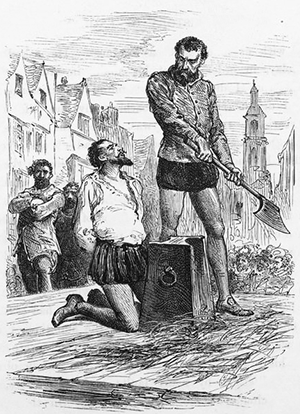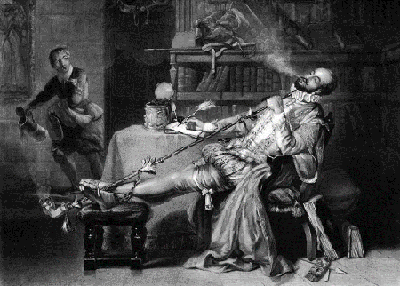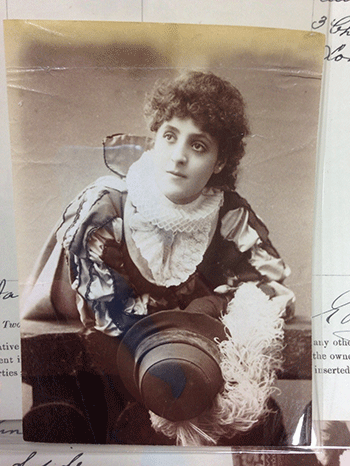
A sketch of Walter Raleigh on the scaffold. Creative Commons NYPL digital gallery, c. 1860.
Ask people about Walter Raleigh and they’ll probably think, if not of a bicycle, of Clive Owen in Elizabethan garb, throwing his cloak over a puddle to spare Queen Elizabeth’s (Cate Blanchett’s) royal toes, or handing out grubby potatoes to be nibbled at by her sheepish advisors. Sadly, as a new biography of Raleigh points out, it’s possible that neither of these things actually ever happened.
Such vignettes (and Clive’s immortal 2007 portrayal) do, however, capture something of the enduring volatility of the reputation Sir Walter left behind – a reputation set in motion by an event that definitely did occur, four hundred years ago on 29 October this year: his execution. On the scaffold stage, Raleigh delivered a swaggeringly subversive speech that went on to circulate widely in many different handwritten versions. Reading the words of such ‘witnesses’, letters, and contemporary chatter about public executions more generally, we can start to appreciate how Raleigh’s electrifying performance and its manuscript afterlife have shaped his many incarnations since. The State Papers in The National Archives contain many such documents.
Raleigh played a host of different roles in Tudor-Stuart life: explorer, soldier, political spy, lawyer, sceptical philosopher, author and bit-of-rough Elizabethan courtier. For one reason or another, he was implicated in a plot against the new King James in 1603, for which he endured fourteen long years in the Tower. Eventually, in 1617, he secured permission to lead an expedition to look for gold in Guiana; but Raleigh incurred the King’s wrath a second time when, on this disastrous voyage, his men attacked a Spanish settlement, risking England’s fragile peace with the Catholic superpower. A letter from Sir Thomas Wilson, whose task it was ‘to worke out what I cold fro’ this arch-hypecryte’, reveals the extent to which James’s anger overshadowed proceedings on Raleigh’s return.
Two months later, on somewhat shaky legal ground, the state put Raleigh to death for treason. Executions were the ultimate expression of its violent power, intended to vindicate that violence by extracting the public confessions of convicted felons bound to die. Paradoxically, though, these occasions could also offer such men and women conspicuous platforms from which to diverge from that script. In this context, Raleigh’s death was a masterpiece of nonchalant stoicism, cheery, charming, and – most shocking of all – insistently innocent. A generous reading of the manuscript evidence paints a vivid picture: puffing on his famous pipe after a large final breakfast, Raleigh thanked God ‘that he hath brought me hither to die in the light and not in darkness […] before the wittnesses of soe many’. Having said his piece, pontificated over the axe that would kill him, and apologised to his executioner for his prolixity, he knelt to his fate without fear or regret.

Walter Raleigh smoking an enormous pipe. Creative Commons.
Realising only too late the stir Raleigh had caused, James’s government set about arguing its legal case at tedious length in print – a medium it denied the dying man’s words. But as various scholars have argued, the harder it tried to win the argument, the more it fanned the flames. Raleigh’s words became a manuscript sensation precisely because they were given no official outlet in print. Nearly a hundred manuscript copies of Raleigh’s scaffold speech still survive in libraries and archives around the world, many of which, intriguingly, travel alongside other texts that also tell us a fair bit about how his death was received. One such example is held here in The National Archives’ collection, under the catalogue reference SP 14/103. Though the arrangement of documents in the State Papers does not always indicate contemporary relationships (they were compiled in the nineteenth century) this long sequence of texts related to Raleigh’s death, in different hands, is quite representative of other repositories on the theme. It begins by listing Raleigh’s first testamentary notes under an explanatory title stating that the ‘Accusations against Sr Walter Rawleigh’ were ‘cleared by him at his death’. The persuasive efficacy of Raleigh’s death is not here in doubt.

‘Accusations against SW Rawleigh cleared against him at his death’ (catalogue reference SP 14/103/70r)
On the flipside, the scribe goes on to reproduce a poem widely associated with Raleigh’s death, which many readers believed he wrote on his final night. This particular witness telescopes events even further, judging it to have been written ‘the morning before his Death and deliuerd to the deane of Westminster a littell before his ende’:
“Euen such is time, which takes in trust
Our youth, our joyes and all we haue.
And payes vs but with age and dust
Whoe in the darke and silent graue
When we haue wandred all our ways
Shutts vp the storye of our days
And from which earth and graue and dust
The Lord shall rayse me vp I trust.”
It’s not hard to see why contemporaries linked the texts like this. Within the intimacy and imaginative fluidity of manuscript settings the poem reads like a microcosm of the world-weary Raleigh strutting and fretting his final hour upon the stage. It also becomes something of self-made epitaph. In the same way, the legal and procedural documents relating to his trial are changed by their physical arrangement in manuscripts such as this, implicitly interrogating the process they bear witness to. At the end of the sequence, finally, is the speech itself, written neatly into a discreet quarto booklet complete with ruled margins and notes.
As some simple catalogue searches of Discovery and State Papers Online (SPO) reveal, our collections are a great hunting ground for further information about the impact of Raleigh’s execution, how it was told, retold and referred to with various kinds of spin and embellishment. These responses were not always merely or simply political: Archbishop George Abbott wrote to Sir Thomas Roe in February 1619 arguing that Raleigh’s death was punishment for his sceptical questioning of ‘Gods being and omnipotency, w[hi]ch that just judge made good upon him’ (catalogue reference: SP 14/105/f.103). Many others would insist resolutely on his innocence. When Raleigh’s nemesis prosecutor, Sir Lewis ‘Judas’ Stukley, looked certain to follow Raleigh himself to the scaffold, Sir Gerrard Herbert noted that ‘all say, it is a just judgement of God for Sr Walter Raweleys bloodde’ in a letter to Dudley Carleton (catalogue reference: SP 14/105 f. 75v). Stukley seems to have become something of a scapegoat.
To some extent, Raleigh could – and can – be anything we want to make him, played by any number of unlikely witnesses, storytellers, manuscript compilers and gossips. Centuries after his death he would even be played by the Victorian actress Miss Phyllis Broughton, who, it must be said, does bring a certain je ne sais quoi to the part. Better than Clive? Jury’s out.

A photograph of Miss Phyllis Broughton as Sir Walter Raleigh, leaning over balcony with hat in hand (catalogue reference: COPY 1/375/124).
Further Reading
Anna Beer, ‘Patriot or Traitor: The Life and Death of Sir Walter Raleigh’ (Oneworld, 2018)
Anna Beer, ‘Textual Politics: The Execution of Sir Walter Raleigh’, Modern Philology vol. 94 (Aug., 1996), pp. 19-38
Andrew Fleck, ‘At the Time of His Death: Manuscript Instability and Walter Ralegh’s Performance on the Scaffold’, Journal of British Studies vol. 48 (Jan., 2009), pp. 4-28
